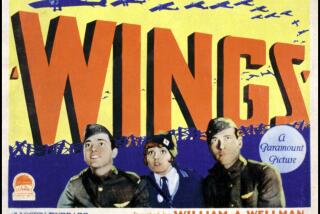The Envelope: Film’s golden year, 1939, included ‘Gone With the Wind,’ ‘Wizard of Oz’
Hollywood has arguably never had such a remarkable year as 1939. The studios released some of its most popular and accomplished films, including the best picture Oscar winner “Gone With the Wind,” the beloved musical fantasy “The Wizard of Oz” and John Ford’s seminal western “Stagecoach,” which turned B actor John Wayne into a major player.
Ten films earned Academy Award nominations for that year’s best picture. In addition to the three above titles, there were the Bette Davis tear jerker “Dark Victory,” the sentimental drama “Goodbye, Mr. Chips,” the romantic drama “Love Affair,” the romantic comedy “Ninotchka,” the tragic “Of Mice and Men,” the romantic “Wuthering Heights” and the political drama “Mr. Smith Goes to Washington.”
“I think what made that such a great year was the depth of it,” said film historian and author Joseph McBride (“Searching for John Ford,” “Frank Capra: The Catastrophe of Success”). “It’s like a baseball team with a great bench. You have the films that were nominated, then you have all these other great films too. Some that weren’t nominated for best picture are better than some that were.”
Among McBride’s personal nominees for films that were honored undeservedly is “Dark Victory,” which stars Davis in her Oscar-nominated role as a wealthy woman with a brain tumor who falls in love and marries her doctor (George Brent). “I always thought it pretty hokey,” McBride said. “It’s one of those films you look back and you kind of scratch your head over why it got so much prestige. I am not against melodrama, but she made a lot better films.”
But there are several films on the nomination list that remain strong — and relevant.
As Hollywood was celebrating the banner year, World War II broke out on Sept. 1 with the Nazi invasion of Poland. It was in that tense political landscape that three films in particular seemed to have something powerful to say: Ford’s “Stagecoach,” Ernst Lubitsch’s “Ninotchka” and Frank Capra’s “Mr. Smith Goes to Washington.”
“These filmmakers were galvanized by the urgency of things going on in the world.” Ford was in the Navy Reserve, McBride pointed out. “He knew the war was coming, and he was going to serve. He made these three Americana films. As I write in my book that was the year John Ford discovered America. He made ‘Stagecoach,’ ‘Young Mr. Lincoln’ and ‘Drums Along the Mohawk’ — all patriotic films that remind us of our bedrock American values that we would soon be fighting for.”
“Stagecoach,” which earned seven Oscar nominations (winning two, for the score and for supporting actor for Thomas Mitchell), also “changed the whole western,” said McBride. “I think it was [French critic] Andre Bazin who said it took all the archetypal western themes and did them to perfection.”
On the surface, “Ninotchka” is a sophisticated romantic comedy starring Greta Garbo in her Oscar-nominated performance as a hard-line Russian sent on a mission to Paris only to fall in love with a capitalist (Melvyn Douglas).
But the film is more complex than it seems. “It deals with issues we still care about, which is totalitarianism versus the individual,” McBride said. “It’s kind of a timeless film, though it is very specifically anti-Stalin. Lubitsch made this film with a lot of personal conviction. He went to Russia in the late ‘30s and was appalled about what he saw of Stalinism.”
“Mr. Smith Goes to Washington,” which revolves around a sweetly naive young man (James Stewart) who is appointed to fill a vacancy in the U.S. Senate and discovers political corruption in the Capitol, earned 11 Oscar nominations and won for best story, the original screenplay prize of its day.
“It’s a very stirring patriotic film and maybe the best political film ever made,” McBride said.
But “Smith” raised more than a few eyebrows when it premiered for politicos in Washington. In fact, Joseph Kennedy, ambassador to Britain and father of President John F. Kennedy, tried to get Columbia Pictures to not release the film in Europe.
“He thought it would be a bad [portrayal] of America,” said McBride. “The film is quite a scathing portrait of corruption, but you have this idealist who overcomes it. Capra admitted to me that he thought ‘Mr. Smith’ was his best film, not ‘It’s a Wonderful Life.’ “‘
Twitter: @mymackie
More to Read
From the Oscars to the Emmys.
Get the Envelope newsletter for exclusive awards season coverage, behind-the-scenes stories from the Envelope podcast and columnist Glenn Whipp’s must-read analysis.
You may occasionally receive promotional content from the Los Angeles Times.







